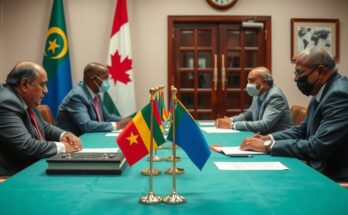At the 16th BRICS summit in Kazan, South Africa has firmly opposed Morocco’s membership in the alliance due to concerns over diminishing influence and historical tensions stemming from the Western Sahara dispute. China, however, has shown openness towards engaging Morocco economically. The summit serves as a platform for discussing the bloc’s expansion, as more nations express interest in joining.
The 16th BRICS summit commenced on October 22, 2023, in Kazan, Russia, where South Africa has unequivocally expressed its disapproval regarding Morocco’s prospective membership in the BRICS economic alliance. This three-day event, concluding on October 24, has gathered leaders from BRICS nations—namely Brazil, Russia, India, China, and South Africa—to deliberate on pivotal global issues, particularly focusing on the topic of expansion. Reports from Bloomberg indicate that South African officials have firmly opposed any initiatives to include Morocco or Nigeria into the BRICS coalition, citing apprehensions about the potential erosion of South Africa’s influence within this influential organization. These sentiments were reiterated by unnamed South African sources who spoke under conditions of anonymity due to the delicate nature of the discussions. The longstanding friction between South Africa and Morocco largely stems from the Western Sahara dispute, a contentious issue that has caused political strains. In April 2022, South Africa successfully brought the Western Sahara issue to the forefront at a meeting involving deputy foreign ministers of the BRICS nations. This tension escalated when South Africa extended an invitation to Brahim Ghali, the leader of the Polisario Front, during the “BRICS/Africa” meeting in Johannesburg—shortly after Morocco rejected an earlier invitation from South Africa, attributing the rejection to strained diplomatic relations. Morocco characterized the invitation as a unilateral gesture by South Africa devoid of consensus from the BRICS collective or the African Union, even as it denied submitting an application for membership. The BRICS coalition, established in 2009, is set to expand significantly, incorporating new members such as Iran, the United Arab Emirates, Ethiopia, and Egypt in early 2024. This expansion is projected to enhance the bloc’s economic weight, combining prominent energy producers with major consumers among developing countries. Alongside these developments, Saudi Arabia has been announced as a prospective member, although a final decision on its accession remains pending. Amidst these dynamics, Russia, which presently chairs BRICS, aims to project the summit as a demonstration of its global stature, notwithstanding the isolation it faces due to ongoing conflicts such as the war in Ukraine. Foreign policy aide Yuri Ushakov has confirmed that the summit will host delegations from 36 nations and six international bodies, marking it as the largest gathering of global leaders in Russia since the Ukraine invasion in February 2022. Contrasting with South Africa’s rigid stance, China appears more accommodating. In September, Morocco received an invitation to partake in the BRICS Forum 2024 focused on industrial collaboration, represented by its Minister of Industry and Commerce, Ryad Mezzour. This invitation underscores the nuanced and intricate relationships within the BRICS framework, as South Africa endeavors to safeguard its regional status while China seeks economic partnerships with Morocco. As the summit continues, it is expected that discussions surrounding the future trajectory of BRICS and its ongoing expansion will dominate the discourse. An increasing number of nations, including Malaysia, Thailand, and Turkiye, have exhibited interest in joining the alliance, thereby magnifying the importance of harmonizing geopolitical interests with a focus on economic growth and cooperation within the bloc.
The BRICS alliance, comprising Brazil, Russia, India, China, and South Africa, has recently been engaged in discussions on expanding its membership amidst ongoing geopolitical tensions. The inclusion of new members is a critical aspect of the alliance’s strategy to enhance economic collaboration between major developing nations. South Africa’s firm opposition to Morocco’s involvement stems from a historical rivalry exacerbated by the Western Sahara conflict, which has created significant diplomatic strains within the region. The 16th BRICS summit serves as a platform for addressing such pressing issues, as well as for showcasing the bloc’s influence on the world stage.
In summary, the 16th BRICS summit has highlighted South Africa’s resolute opposition to Morocco’s potential membership, a position rooted in concerns about national influence and historical geopolitical tensions, particularly regarding the Western Sahara. As the summit progresses, the interplay between member nations, particularly the differing approaches of South Africa and China, will be pivotal in shaping the future identity and expansion of the BRICS alliance amidst a backdrop of increasing interest from other nations.
Original Source: www.moroccoworldnews.com




